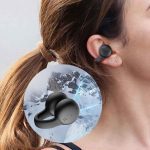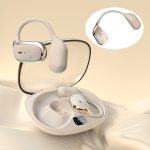With the increasing popularity of smartphones and smartwatches, Bluetooth headphones have seen an incremental rise in sales across the world.
As a comparison to wired headphones, Bluetooth headphones provide unmatched freedom and flexibility while also saving users from the hassle of tangled wires.
With the continuous advancements in chip and battery technologies, small earbuds and in-earphones headphones have become the epitome of high-quality audio.
In this article, we will discuss how the tiny chips play an important role in driving the popularity of Bluetooth headphones and the most common headphones chips used by headphone manufacturers across the globe.
Why are chips important for headphones?
Most Common Types of Headphone Chips
- W1 and H1
- Samsung MUB01
- Qualcomm QCC514
- Cypress CYW20721
- Beken 3431 and 3260
- Actions ATS Series
- Airoha AB1532
- Jieli AC69 Series
- Realtek RTL8763B
Table of Contents
ToggleWhy are chips important for headphones?
Chips work as the brain controlling all the key features such as voice-activated commands, management of sensors, power, and maintaining a stable wireless connection.
The size of the chipset is also responsible for ensuring the optimum space for batteries. For instance, a smaller chipset can accommodate a larger battery.
This is the reason why tech giants like Samsung and Apple highlight the chipset version in their latest wireless headphones.
Most Common Types of Headphone Chips
Let’s start with the most common type of headphones chips being used by manufacturers across the globe.
- W1 and H1 chipset
Both the W1 and H1 are proprietary Apple products. While the AirPods are fitted with the W1 chipset, the AirPods Pro has the H1 processor.
The H1 chipset has distinct advantages over the W1 chipset. It supports Siri voice control, additional talk time capability, faster switching between connected devices, a 30% reduction in gaming latency, and overall faster connectivity during phone calls.
The latest H1 chipset is based on the system-in-package design that enables it to stack up several integrated circuits—saving space in the earbuds. The package has a total of 10 audio core processors that deliver a low-latency audio signal with real-time noise cancellation.
- Samsung MUB01
For its Galaxy Buds Plus, Samsung uses the MUB01 all-in-one power management chipset. The chipset has up to 10 discrete components placed on a single chip—including switching chargers and discharge circuits that enable the chipset to take lesser space.
This has enabled the company to create more space for the battery, delivering longer playback time and a small form factor.
- Qualcomm QCC5144
Qualcomm QCC514 is a capable chipset, optimized for earbuds and other types of wearable Bluetooth audio. It uses the Qualcomm Active Noise Cancellation technology (ANC) with voice assistant support and Qualcomm TrueWireless Mirroring technology to deliver a commendable wireless listening experience.
The chipset is an ultra-low-power version designed for both entry-level and mid-level Bluetooth headphones. Along with efficient battery consumption, it also performs well in terms of connectivity, sound quality, and call quality.
With active noise cancellation becoming a standard feature, the chipset supports hybrid active noise cancellation that allows you to hear environmental sounds with a hear-through transparency feature.
- Cypress CYW20721
The Cypress CYW20721 is another capable Bluetooth chipset that enhances the listening experience of wireless headsets. It is based on Wireless Audio Stereo Sync (WASS) application and Low Energy Bluetooth (BLE) audio MCU that ensures stable wireless connectivity.
In comparison to various other TWS, the Cypress CYW20721 has a 6dB higher link budget, which enhances the effective transmission distance. With a longer transmission distance, the listener can enjoy uninterrupted audio even if the device is placed in the back pocket.
It is also a power-efficient chipset utilizing 50% less power than several other products in this range.
- Beken (BK) 32 series
The BK32 series is an integrated Bluetooth 4.0 low-power single-mode chipset that includes high-performance RF transceivers, baseband, ARM core microprocessors, and various programmable protocols.
It also has rich feature peripheral units and profiles to support BLE applications. The use of flash memory allows it to be used for custom applications.
Whereas, the BK32 series is a Bluetooth 4.0 dual-mode audio chipset that includes a 14443-A NFC card, RF transceiver, a FLASH memory controller, and multiple analogs and digital peripherals.
Both the BK chipsets are low-cost and high-performance-oriented designs that enable stable wireless connectivity and a rich audio listening experience.
- Jieli AC69 series
Jieli is a leading chipset manufacturer based in Zhuhai, China. Its flagship SoC – AC69 series are highly power-efficient Bluetooth TWS solutions, with native support for ANC and ENC.
The chipset is also affordable and equipped with a 32-bit processor including FPU and DSP accelerator. It has advanced product features such as multi-source support, fast pairing, and gesture customization.
- Actions ATS Series Bluetooth Chips
The Actions ATS Series boasts Bluetooth 5.0 support with dual-mode configuration and transmission power of up to 10dBm. The chipset is robust with a reception sensitivity of -95dbm, which reflects the high level of stability of the audio connection.
It is also a power-efficient chipset with a no-load power consumption of 5mA and a latency of only 50ms. The ATS Series also supports dual-microphone ENC technology.
- Airoha AB1532
The supports Bluetooth 5.0 and high-resolution music support through its inbuilt high-performance DSP.
The chipset also offers high-middle and low-frequency automatic compensation with native support for multi-MIC and a wide range of peripheral interfaces.
With better RF characteristics and a simple antenna design, it provides a highly stable audio connectivity and low power consumption of less than 10mA. However, the latency is a bit on the higher side at 130ms.
- REALTEK RTL8763B
The chipset is a comprehensive Bluetooth headset integrated solution supporting Bluetooth 5.0, HFP 1.7, A2DP 1.3, binaural calling, and many more audio standards.
It is based on a 32-bit ARM processor with a 24-bit DSP. The clock speed is 160Mhz, and there is also an inbuilt 8Mbits Flash memory.
For optimizing the battery performance, the chipset comes with a Li-ion battery charge management feature that also safeguards the device from overvoltage, overcurrent, and under-voltage.
To enhance scalability, the chipset supports three LED drivers, touch IC control, and supports both analog and digital microphone inputs.
For noise reduction, the chipset has noise reduction and ambient sound monitoring modes.
Conclusion
In this article, we have covered the most common types of chipsets used in wireless Bluetooth headphones manufactured across the globe.
With the latest advancements in Bluetooth technology and integrated chips, newer wireless headphones have superior audio reproduction, efficient power consumption, and smaller designs. This enables the users to enjoy high-quality music with long playback times.
If you are interested in making bulk purchases of wireless headphones from China, make sure you only select companies that use the chipsets mentioned in this article to ensure reliability and superior performance.




